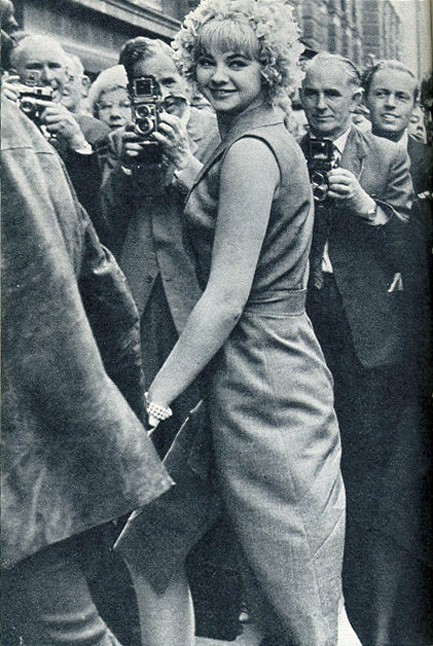| Femmes Fatales | Nov 20 2011 |


Q: What do you do when you find yourself in the middle of a national scandal? A: Parlay the recognition into money. The above photo of Welsh-born party girl Mandy Rice-Davies made us think yet again of that question and answer. The first time we remember considering them (because Rice-Davies was before our time), was during the Bill Clinton/Monica Lewinsky scandal. Lewinsky appeared on the cover of a national magazine and an acquaintance of ours commented that she must be mortified by the entire situation. But we noted, “Not so mortified that she didn’t manage to get into an expensive photography studio and get these shots made.” Not an affordable thing for a D.C. intern with legal fees looming, but no problem for a person who has signed a representation deal and is being backed by managers.
Likewise this photo of Mandy Rice-Davies tells the world she isn't the least interested in hiding, but rather in embracing her unexpected fame, derived from her role—along with friend Christine Keeler—in the Profumo Affair that rocked Britain’s conservative government in 1963 with tales of wild parties, paid sex, and nuclear secrets. Rice-Davies used the notoriety she gained to release pop singles, open nightclubs bearing her name, and write an autobiography and a novel. She and Keeler weren’t the first ordinary citizens to rise to fame on the back of a sexual scandal, nor the first to use that recognition for their benefit, but their case seems like a historical marker, telling us we were entering fully into an age in which infamy, pain and public spectacle would rank equally with creativity and intelligence as undifferentiated collateral to be traded for cash. A culture of Hiltons, Kardashians and Joe the Plumbers speaks to this truth. You can read more about Mandy Rice-Davies here.
which infamy, pain and public spectacle would rank equally with creativity and intelligence as undifferentiated collateral to be traded for cash. A culture of Hiltons, Kardashians and Joe the Plumbers speaks to this truth. You can read more about Mandy Rice-Davies here.
| Intl. Notebook | Feb 2 2009 |


Winona, Paris, Nicole—read and learn. Patty Hearst was first a millionaire socialite, then a kidnap victim, then a self-described urban revolutionary and machine gun toting bank robber. She went on trial for armed robbery in January 1976, and the proceedings continued through March. Newsweek produced the grainy cover you see above twenty-two years ago today. Despite the efforts of celebrity lawyer F. Lee Bailey, Hearst was sentenced to 35 years. But her sentence was commuted by president Jimmy Carter after a mere 22 months of time served, even though she had refused at trial to give evidence against her kidnappers/accomplices. She was later given a full pardon by Bill Clinton. Psychologists claim Hearst was not responsible for her actions due to the effects of Stockholm syndrome, which basically means she started digging her kidnappers. We're gonna try that excuse next time we get arrested, but we have a feeling it won’t work.




































































